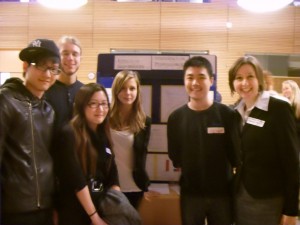I hope this holiday season has brought you much joy and peace. Last week was quite hectic for me as I finished up grades for term 1 while preparing syllabi for term 2 (I’ll finalize and post those in a couple of days). But then I had a wonderful long weekend celebrating Christmas with my husband. For the past few years we’ve had friends in town to share festivities, and that’s always lovely fun. This year it was just the two of us, and it was perfect too 🙂 One of the things we love to do together is cook. We just love the teamwork! So this weekend we spent ages cooking together… and then eating our delicious results!
I still can’t believe how quickly Term 1 went by! The end of November brought our 2nd Annual Psyc 217 Research Methods Poster Session: this year with over 130 posters and over 600 students across 7 sections of the course. The energy about research projects was exciting! I think we developed a good system this year too, smoothing out some of the registration kinks from last year. Next year we’ll be ready to bring in a larger audience and media — how exciting!
Our Psyc 100 Section 002 is coming along swimmingly in my opinion. The larger size (about 375) compared with last year (about 270) presented a few disruptions at the beginning of the term, but I think those are subsiding for the most part. A unit that stands out for me this past term was Language and Thinking: We had great fun exploring how babies learn one language and two. Such fascinating research is being done on this front! Take a look at this TedTalk by Dr. Patricia Kuhl for a taste of what we learned. If you are in this course, what was your favourite unit from Term 1?
Thanks to everyone for an interesting Term 1. It has been great getting to know many of you, and I hope to meet everyone else in Term 2. I look forward to another exciting term of leading you on your learning journey!

 Follow
Follow
